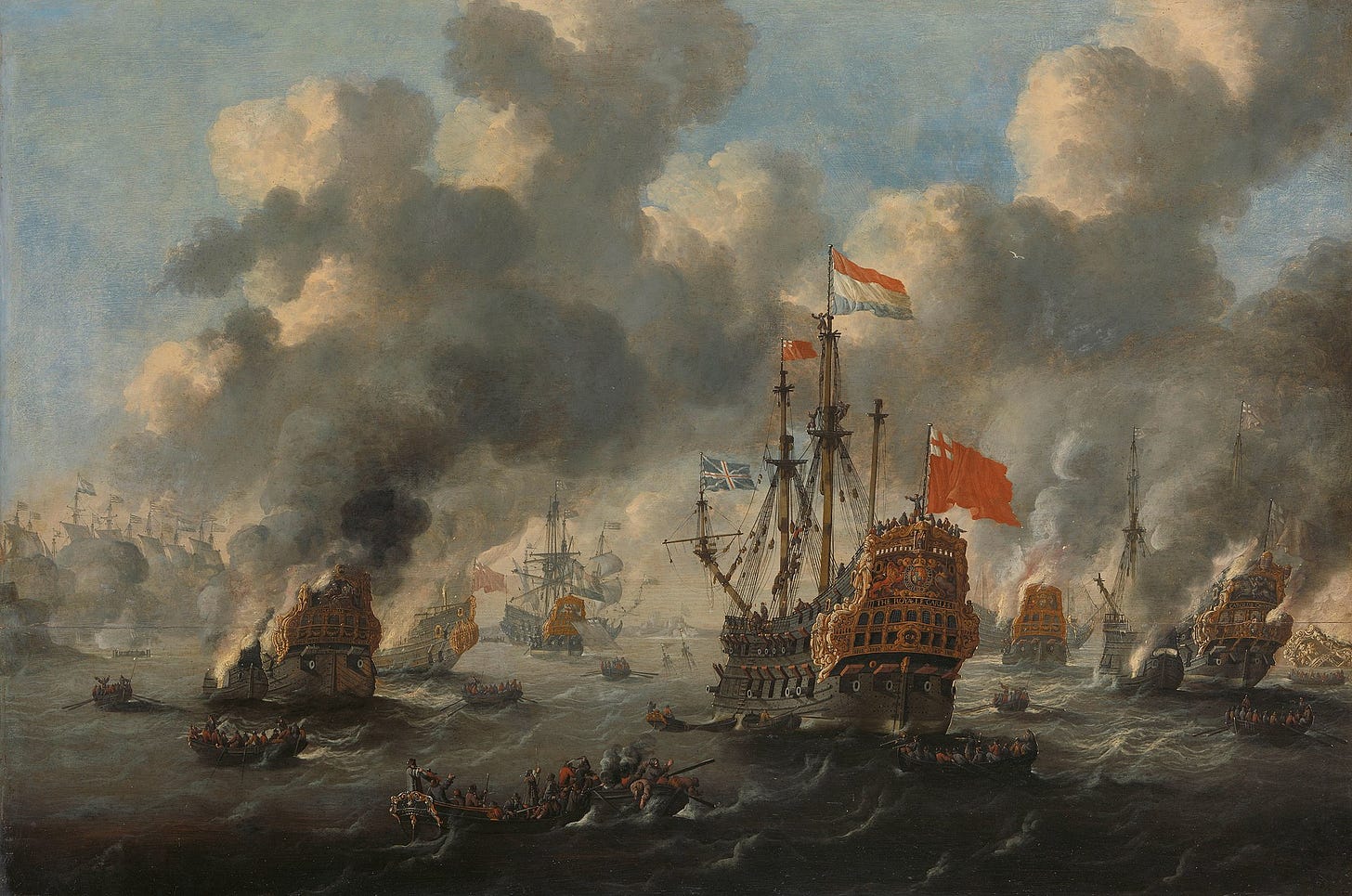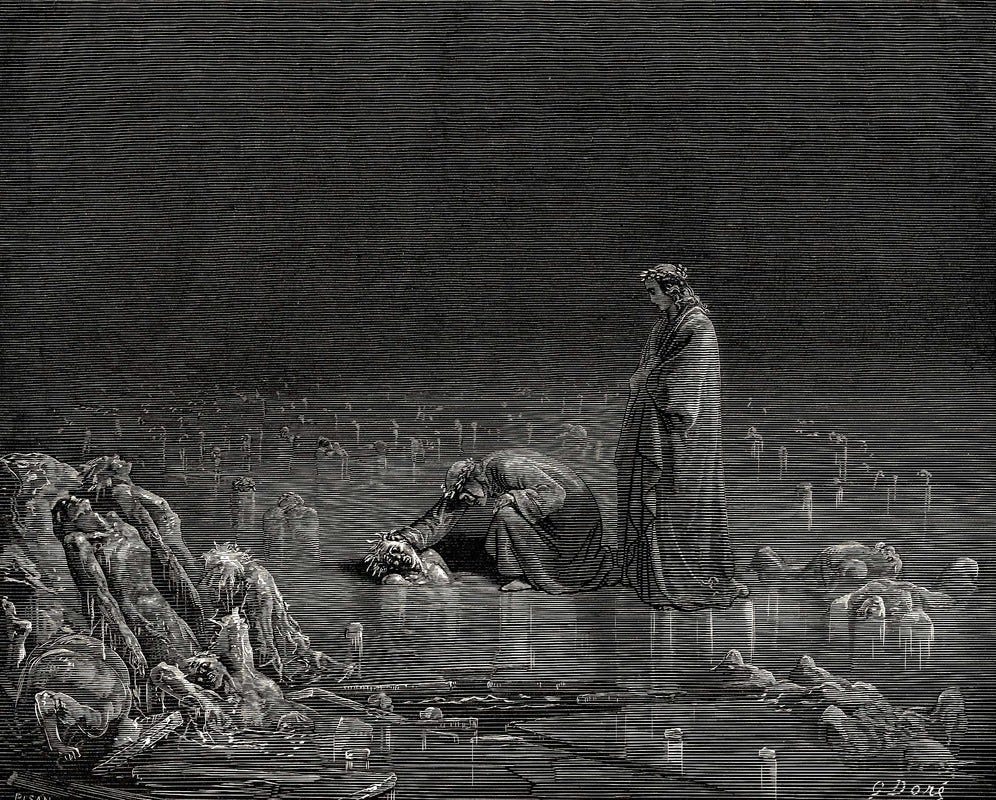Alfred McCoy: A World in Transition and the Rise of Capital Rule
The Dutch encroach on the Spanish and Portuguese Empires — Part Three of a series on McCoy's 'To Govern the Globe'
The God that holds you [the unconverted] over the pit of hell, much as one holds a spider, or some loathsome insect over the fire, abhors you, and is dreadfully provoked: his wrath towards you burns like fire; he looks upon you as worthy of nothing else, but to be cast into the fire; he is of purer eyes than to bear to have you in his sight; you are ten thousand times more abominable in his eyes, than the most hateful venomous serpent is in ours.
—Jonathan Edwards, “Sinners in the Hands of an Angry God” (1741)
This is the next in a series of essays that looks at Alfred McCoy's epic telling of the quest for world domination — not regional rule, like Caesar or Alexander, but truly global control.
The full series includes these pieces:
Introduction: ‘To Govern The Globe’ — A view from the edge of the cliff
Alfred McCoy: The Quest for Global Control — The Iberian Age
Alfred McCoy: A World in Transition and the Rise of Capital Rule (this piece) — The Dutch encroach on the Spanish and Portuguese Empires
Alfred McCoy: The British Empire and Scientific Racism — Justifying Western abuse in the 19th century
Alfred McCoy: Controlling the 'World Island' — Using sea power to dominate Asia
This part looks at the transition from the Iberian order, what McCoy calls “state sovereignty,” which began in the 1400s, was dominated by Portugal and Spain, was based on imperial armies, murder and rape and was morally backstopped by Papal permissions like this:
As his captains delivered the first African captives, Prince Henry [of Portugal], in a clever diplomatic artifice, petitioned the Vatican to elevate his explorations to a crusade, prompting Pope Eugene IV to issue a bull (Dum Diversas, 1452) that would legitimate “perpetual servitude” for all non-Christian captives. ... While earlier papal bulls had granted Christian crusaders limited rights to enslave Muslim captives in the Holy Land, the pope now broadened that permission to allow for the perpetual slavery of all peoples beyond the known world.
The new order that would emerge, which today we identify with the British, was in fact ushered in by the Dutch, who challenged the Iberian order in two simultaneous ways:
The Dutch through superior technology began to chip away at Portuguese- and Spanish-controlled territory and trade
Iberian "state sovereignty" began to give way to infant Dutch capitalism via the Dutch East India Company (1602) and others like it. The state gave way to the merchants and money control: the wave of the future, our future, and also our end.
A Brief Note
As usual with posts like these, two notes. One, they're nestled under the ‘Book Club’ pulldown at the top of this site’s main page. And second, they are paid-subscriber posts for the reason outlined here.
The Protestant Justification for Murder and Greed
As I said at the start of these posts, McCoy has two themes. One is the struggle for global wealth and power and the advantages that shifting energy sources and tech conferred on cultures also inclined to be cruel.
The other is the shifting justifications for monstrous brutality, inflicted by the West on all who stood in its way. The wealth-mad Catholic murders of Iberia absolved themselves of their sinfulness via the Pope. Here's how the Protestant Dutch declared themselves clean:
In an assembly convened in 1618 to resolve theological conflicts within Protestantism, known as the Synod of Dordrecht, the Dutch Reformed Church adopted the Calvinist doctrine of “divine election,” which held that certain individuals and groups were favored by God’s protection. According to that logic, the Dutch, as God’s elect, could struggle confidently against enormous adversity to win their independence from Spain, while denying that same freedom to subjects overseas who lacked such divine grace. Specifically, the Synod ruled that a slave’s conversion to Christianity did not confer freedom, implicitly affirming the morality of slavery. As a result, for much of the seventeenth century, the Dutch would, in good conscience, dominate both the transatlantic slave trade and the production of sugar on slave plantations, while using slave labor throughout their Indian Ocean empire, whether in the cultivation of spices in eastern Indonesia or on farms in South Africa. Even in the late eighteenth century, when Enlightenment ideals inspired an abolition movement in England, the Dutch attitude was largely unaffected, and they continued to trade slaves without restraint until the British finally forced them to stop.
For more on this, see Erich Fromm's magnificent and seminal book, Escape from Freedom, which starts with the question, “Why did the German's love Hitler?” and ends by asking instead, “Why did the West turn so cruel at the start of the Age of Science?”
The answer: because of the spread of what he called the “sado-masochistic personality” — people who need to be slaves to someone above and vicious to those below — a need undiminished and very much with us today. (See “Sinners In the Hands of an Angry God” by the Calvinist Jonathan Edwards for a helpful reminder of both of those sick needs. Or watch Judge Judy; your choice.)
Dutch Wealth, Technology and Merchant Culture
The following details the start of Dutch domination and the transition to the next world order, that of the British.



